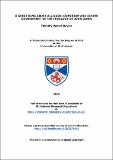Files in this item
A great king above all gods : dominion and divine government in the theology of John Owen
Item metadata
| dc.contributor.advisor | Webster, J. B. (John Bainbridge) | |
| dc.contributor.author | Baylor, Timothy Robert | |
| dc.coverage.spatial | vi, 207 p. | en_US |
| dc.date.accessioned | 2016-10-11T15:38:27Z | |
| dc.date.available | 2016-10-11T15:38:27Z | |
| dc.date.issued | 2016-07-01 | |
| dc.identifier.uri | https://hdl.handle.net/10023/9646 | |
| dc.description.abstract | Scholarship has tended to depict John Owen as a “Reformed catholic” attempting a synthesis of Reformed principles with a largely Thomist doctrine of God. In this thesis, I argue that this depiction risks losing sight of those aspects of Owen’s doctrine of God that are intended to support a distinctly Protestant account of the economy of grace. By an examination of the principles of divine government, I argue that Owen employs the theme of God’s “dominion” in order to establish the freedom and gratuity of God’s grace, and to resist theologies that might otherwise use the doctrine of creation to structure and norm God’s government of creatures. In chapter one, I argue against prevailing readings of Owen’s thought that his theology of the divine will is, in fact, “voluntarist” in nature, prioritizing God’s will over his intellect in the determination of the divine decree. I show that Owen regards God’s absolute dominion as an entailment of his ontological priority over creatures. Chapters two and three examine the character of God’s dominion over creatures in virtue of their “two-fold dependence” upon him as both Creator and Lawgiver. Chapter four takes up Owen’s theology of God’s remunerative justice in the context of his covenant theology. I show here that his doctrine of divine dominion underwrites his critique of merit-theology and attempts to establish the gratuity of that supernatural end to which humans are destined. Finally, in chapter five, I examine the principles of God’s mercy, expressed in the work of redemption, where I demonstrate how Owen’s conception of divine dominion underwrites the freedom of God in election and his account of particular redemption. | en_US |
| dc.language.iso | en | en_US |
| dc.publisher | University of St Andrews | |
| dc.subject | John Owen | en_US |
| dc.subject | Puritanism | en_US |
| dc.subject | Reformed theology | en_US |
| dc.subject | Divine government | en_US |
| dc.subject | Divine justice | en_US |
| dc.subject | Divine dominion | en_US |
| dc.subject | Thomism | en_US |
| dc.subject | Voluntarism | en_US |
| dc.subject | Intellectualism | en_US |
| dc.subject | Creation ex nihilo | en_US |
| dc.subject | Scholasticism | en_US |
| dc.subject | Reformed orthodoxy | en_US |
| dc.subject | Particular redemption | en_US |
| dc.subject | Limited atonement | en_US |
| dc.subject | Divine will | en_US |
| dc.subject | Divine freedom | en_US |
| dc.subject | Merit | en_US |
| dc.subject | Covenant theology | en_US |
| dc.subject | Sabbath | en_US |
| dc.subject | Law | en_US |
| dc.subject | Moral theology | en_US |
| dc.subject | Providence | en_US |
| dc.subject.lcc | BX5207.O88B2 | |
| dc.subject.lcsh | Owen, John, 1616-1683 | en_US |
| dc.subject.lcsh | Providence and government of God--History of doctrines--17th century | en_US |
| dc.subject.lcsh | Grace (Theology)--History of doctrines--17th century | en_US |
| dc.subject.lcsh | Covenant theology--History of doctrines--17th century | en_US |
| dc.title | A great king above all gods : dominion and divine government in the theology of John Owen | en_US |
| dc.type | Thesis | en_US |
| dc.type.qualificationlevel | Doctoral | en_US |
| dc.type.qualificationname | PhD Doctor of Philosophy | en_US |
| dc.publisher.institution | The University of St Andrews | en_US |
This item appears in the following Collection(s)
Items in the St Andrews Research Repository are protected by copyright, with all rights reserved, unless otherwise indicated.

